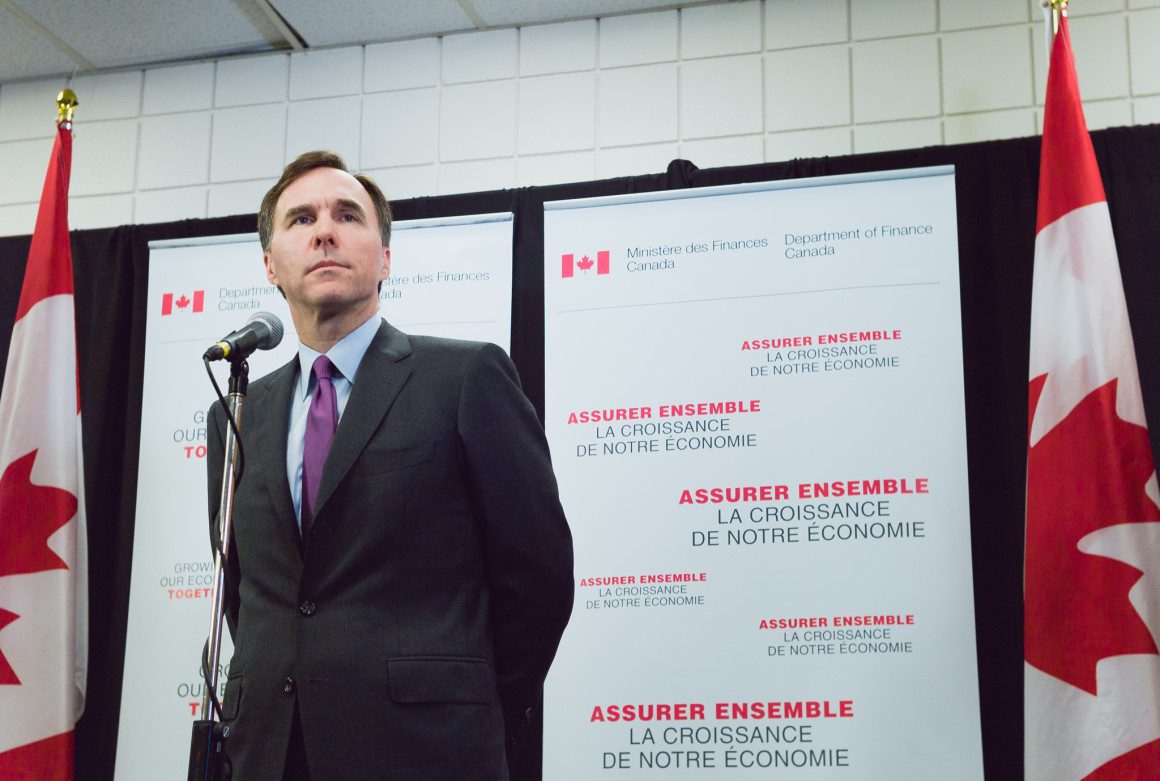
Takeaways from the 2018 federal budget for post-secondary students
By Matty Hume and Tina Shaygan, February 27 2018 —
Canadian Minister of Finance Bill Morneau tabled the 2018–19 Canadian federal budget in the House of Commons on Feb. 27. The budget includes a $18.1-billion deficit and notes a $3-billion “budgetary risk adjustment.”
The 369-page, five-chapter document is a lengthy policy package. To help parse the massive document, here are some of the highlights that directly pertain to University of Calgary students and post-secondary communities.
Canada Summer Jobs Program:
The budget outlines changes to the Canada Summer Jobs Program, effective for the 2018–19 cycle. The federal government plans to add $448.5 million over the course of five years to the Youth Employment Strategy. It’s also noted that a renewal of the Youth Employment Strategy will be announced in the next year.
The government plans to invest in a ‘digital platform’ that will provide consistently up-to-date information regarding in-demand skills from employers and estimated income in various fields. The proposal includes investing $27.5 million over five years, with an additional $5.5 million each subsequent year from Employment and Social Development Canada’s existing resources. This money will be used to support the “Education and Labour Market Longitudinal Linkage Platform.”
The budget also proposes amendments to the Employment Insurance Act. This includes making the current “Employment Insurance Working While on Claim” rules permanent. This would allow “claimants to keep 50 cents of their EI benefits for every dollar they earn, up to a maximum of 90 per cent of the weekly insurable earnings used to calculate their EI benefit amount.” This is estimated to provide $351.9 million to EI claimants over five years beginning this year or $80.1 million per year.
Student aid, adult learners and research:
The government intends to continue working on promises made in the 2017–18 budget in this area. A three-year pilot project will take effect on Aug. 1, that provides adult students returning to post-secondary after multiple years in the workforce with an additional $1,600 in grant funding each school year. The budget also notes that the project will make it “easier” for mature students to be eligible for grants, noting declined income as a result of becoming a student.
The 2018 budget also proposes investment into Canada’s three research grant councils — the Natural Sciences and Engineering Research Council (NSERC), the Canadian Institutes of Health Research (CIHR) and the Social Sciences and Humanities Research Council (SSHRC). The proposed investments total $925 million over five years and $235 million each subsequent year. The 2018 budget also proposes a new interdisciplinary ‘tri-council fund’ with $275 million over the next five years and $65 million each subsequent year. Within three years, the two proposals will increase the annual budgets of the granting councils by 25 per cent.
Additional proposed investment includes an increase to the Canada Research Chairs Program, which will add additional chairs to early-career research and to the Research Support Fund. This aims to cover indirect research expenses and the Canada Foundation for Innovation, which will provide additional funding for labs and equipment.
University of Calgary president Elizabeth Cannon said there has been a significant need for investment in “fundamental science.”
“The needs are significant and the government really came through,” Cannon said. “Significant amount of funding and targeted in areas that I think is really going to help support our scholars and through that our students, both undergrad and graduate.”
Cannon added that the budget also targets investigator-led research, which is what the university has been advocating for in Ottawa.
“We have not seen an investment of this kind for many, many years,” Cannon said.
Sexual Assault on Campus:
The 2018 federal budget emphasizes support for sexual assault crisis centres on Canadian campuses. According to a 2015 CBC article, the number of reported sexual assaults on Canadian post-secondary campuses is “shockingly” low. This year’s federal budget provides $5.5 million over five years to Status of Women Canada to create a unified framework for dealing with sexual violence on campuses. Furthermore, the budget states that starting in 2019, the Canadian government will consider withdrawing federal funding for post-secondary institutions that are not implementing “best practices” regarding sexual violence on their campuses.
Cannon said while the U of C is still analyzing the budget document, they are open to any programs or funding regarding the subject.
“Clearly, it is an important topic on campuses across the country,” Cannon said. “We would welcome any funding or initiative that would help support the work that we’re doing here on our campus and on campuses across the country.”
